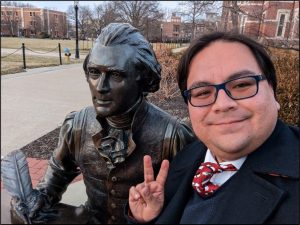PostDoc Spotlight, Postdoctoral News,

Dr. Landgrave is currently a Postdoc in the Truman School of Government and Public Affairs in the PFFFD program, and in Fall 2023 he will transition to Assistant Professor in the Truman School of Government and Public Affairs at MU.
“How has your experience as an underrepresented member of our society shaped your research, including its impact?” My family and I migrated to the United States because we wanted a better life. The United States is a democratic nation where everyone – even someone born in a poor migrant family – can move up in life if they work hard enough. My research focuses on detecting and finding best practices for reducing inequities in government service (e.g., making sure all Americans can vote) because I want to do my part in maintaining America’s democracy. All of us – regardless of our background – must do our part to preserve our democracy and my research is how I try to do my part. When I’m not working at the lab, I spend my free time on home improvement. As a new homeowner I have learned to enjoy plumbing, painting, roofing, and general repairing on the weekends. I look forward to gardening as the weather improves.
